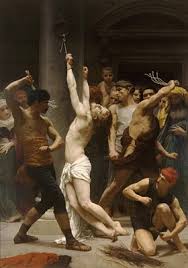1 Brothers, if anyone is caught in any transgression, you who are spiritual should restore him in a spirit of gentleness. Keep watch on yourself, lest you too be tempted. 2 Bear one another’s burdens, and so fulfill the law of Christ. 3 For if anyone thinks he is something, when he is nothing, he deceives himself. 4 But let each one test his own work, and then his reason to boast will be in himself alone and not in his neighbor. 5 For each will have to bear his own load. 6 One who is taught the word must share all good things with the one who teaches. 7 Do not be deceived: God is not mocked, for whatever one sows, that will he also reap. 8 For the one who sows to his own flesh will from the flesh reap corruption, but the one who sows to the Spirit will from the Spirit reap eternal life. 9 And let us not grow weary of doing good, for in due season we will reap, if we do not give up.10 So then, as we have opportunity, let us do good to everyone, and especially to those who are of the household of faith.
.
1. Caught in any transgression? Is this one of those “gotcha” type of things?
Being free from the Mosaic Law does not mean being free from responsibility. In this section Paul explained various responsibilities that Christians have to one another to clarify the will of God for his readers.
The situation Paul envisioned here is that of sin overtaking a Christian as a runner overtakes a walker. It is not that God has caught him in the act of sinning as much as that sin has gotten the better of him in a particular instance. He has been surprised by sin rather than detected in it. “Trespass” (Gr. paraptoma) is not habitual action but an isolated act. Neither is it intentional sin but inadvertent wrongdoing. CN
.
2. Who should do the restoring here? Is this the job of the clergy or pastors etc.?
This does not refer to an elite class of Christians but rather to those who have more maturity and experience in the Christian life and who are therefore in a position to help their beleaguered brother or sister. The adjective “spiritual” means “living and walking according to the Holy Spirit”. ESV
 However the “spiritual” Christian is the one that should do this, namely, one whose life bears the fruit of the Spirit because he or she habitually walks by the Spirit. The more spiritually mature, having walked by the Spirit for some time. The spiritual Christian must restore the Christian who has stumbled gently, carefully, and cautiously. The spiritual Christian can avoid a spirit of self-righteousness in dealing with those who stumble by remembering his or her own personal vulnerability to temptation.
However the “spiritual” Christian is the one that should do this, namely, one whose life bears the fruit of the Spirit because he or she habitually walks by the Spirit. The more spiritually mature, having walked by the Spirit for some time. The spiritual Christian must restore the Christian who has stumbled gently, carefully, and cautiously. The spiritual Christian can avoid a spirit of self-righteousness in dealing with those who stumble by remembering his or her own personal vulnerability to temptation.
The word used for “restore” in this verse is a verb which means “to set a broken bone.” If a fellow falls down and breaks his leg, what are you going to do? Are you going to walk off and leave him in pain? God says, “You who are spiritual set the broken bone. Get him back on his feet again.” It is to be done in the spirit of meekness .JVM
.
3. How can we bear another’s burdens?
To bear one another’s burdens is the supreme imitation of Jesus, the ultimate burden-bearer. Now burden (baros) means “fault”—“If a man be overtaken in a fault.” That’s his burden. You could help him bear it. It also means infirmity, a weakness, an ignorance, a pressure, a tension, a grief. To bear one another’s burdens is the supreme imitation of Jesus, the ultimate burden-bearer. He has even gone to the length of taking mankind’s sins and the curse of the law upon himself. and so fulfill the law of Christ. Though Paul insists that the Galatians are free from obeying Jewish ceremonial laws, this does not mean they are free from all of God’s moral requirements. The “law of Christ” in a broad sense means the entire body of ethical teaching that Jesus gave and endorsed, but in a specific sense here it probably refers to the command to love one’s neighbor as oneself, which, if followed fully, will result in obeying the rest of God’s moral law.
.
4. What is the danger here?
The danger comes from legalistically dealing with the faults of others. Legalists tend to evaluate their personal spirituality in light of the performance of others. The legalist thus rejoices at the fall of another brother, since he appears better in comparison. His response is that of smug superiority and self-righteous condemnation. His judgment makes him blind to his own sins. The scribes and Pharisees were“shocked” at the sin of the woman caught in adultery, but they were aloof about their sins concerning pride, materialism, and their neglect of the widows and orphans, and even of their own parents.
Paul elsewhere soundly condemned the practice of measuring ourselves against others: “For we are not bold to class or compare ourselves with some of those who commend themselves; but when they measure themselves by themselves, and compare themselves with themselves, they are without understanding” 2 Cor. 10:12 Bob Deffinbaugh bible .org
.
5. Sowing and reaping, is this Karma?
 If a person selfishly withholds what he has, he will not see God multiply it and bless him with it. If he follows the prompting of his sinful nature in his investments, he will reap death, but if he follows the Spirit, he will reap life. This is not saying he will necessarily die but that his sowing will yield a disappointing harvest. Neither is it saying that he can earn justification. It is saying that his sowing will yield the best harvest. Our harvest will suffer if we grow weary and stop sowing. Remember that the context of this section is the support of Christian workers, though these principles certainly have wider application.
If a person selfishly withholds what he has, he will not see God multiply it and bless him with it. If he follows the prompting of his sinful nature in his investments, he will reap death, but if he follows the Spirit, he will reap life. This is not saying he will necessarily die but that his sowing will yield a disappointing harvest. Neither is it saying that he can earn justification. It is saying that his sowing will yield the best harvest. Our harvest will suffer if we grow weary and stop sowing. Remember that the context of this section is the support of Christian workers, though these principles certainly have wider application.
“Paul here seems to regard the whole of a man’s earthly life as a period of sowing, with harvest awaiting him on the last day: the eschatological yield is determined by present sowing.” The term “eternal life”has two different though related meanings in the New Testament. Essentially it is the life of God that He shares with believers. On the one hand, the New Testament writers spoke of it as a gift that one receives by faith. However it also refers to the quality of the believer’s life that depends on the extent to which he or she walks with God in fellowship. In this second sense, some believers experience eternal life to a greater extent than other believers do. It is in this second sense that Paul spoke of eternal life here. CN
While believers await their rewards they should do good. The primary focus should be on serving those in the church, but never to the exclusion of people in the wider world.
Sowing and reaping: This is an immutable law that operates in every sphere of life. In agriculture and horticulture if you sow corn, you get corn; if you sow cotton, you reap cotton. In the moral sphere you also reap what you sow. God says you will reap what you sow. God will not be mocked. When you sow corn, you reap corn. When you sow sin, that is what you will reap, you will reap the consequences of that sin, either in this life or the next. JVM
But I say to you that for every idle word men may speak, they will give account of it in the day of judgment. For by your words you will be justified, and by your words you will be condemned.” Matt 12:36-37 (NKJV)
.
11 See with what large letters I am writing to you with my own hand. 12 It is those who want to make a good showing in the flesh who would force you to be circumcised, and only in order that they may not be persecuted for the cross of Christ. 13 For even those who are circumcised do not themselves keep the law, but they desire to have you circumcised that they may boast in your flesh. 14 But far be it from me to boast except in the cross of our Lord Jesus Christ, by which the world has been crucified to me, and I to the world. 15 For neither circumcision counts for anything, nor uncircumcision, but a new creation. 16 And as for all who walk by this rule, peace and mercy be upon them, and upon the Israel of God. 17 From now on let no one cause me trouble, for I bear on my body the marks of Jesus. 18 The grace of our Lord Jesus Christ be with your spirit, brothers. Amen.
.
6. Why does Paul mention his hand writing?
Paul is saying that he has written with large letters, which is characteristic with folk who have poor vision. This, I believe, bears out the theory that Paul’s“thorn in the flesh” was eye trouble (see 2 Cor. 12:7). As you recall, he had said to them earlier, “… I bear you record, that, if it had been possible, ye would have plucked out your own eyes, and have given them to me” (Gal. 4:15). I am sure that Paul had a serious visual problem.
When Paul wrote his Epistle to the Romans, he dictated it to a secretary. And at the conclusion of the letter, Paul said to the secretary, “Now if you want to put in your greetings, go ahead and do it.” So in Romans 16:22 we have the secretary’s salutation: “I Tertius, who wrote this epistle, salute you in the Lord.”
However, when Paul wrote to the Galatians, he was angry.He had heard that they were mixing the gospel with law—and when that is done, the gospel of the grace of God is absolutely destroyed. He couldn’t wait for a secretary to arrive—he just sat down and wrote to them himself. Because he didn’t see clearly, he wrote with large letters. JVM
.
7. From Paul’s perspective what is the compelling motivation for the Judaizers to insist on circumcise?
The issue which Paul makes with the Judaizers is that between the cross of Christ and circumcision. To Paul, the cross was the source of his salvation. More than anything else, the “cross” summarized Paul’s message, while circumcision was the essence of the teaching of the Judaizers. The real reason for this is explained in verses 12-17. Paul gloried (boasted) in the cross of Christ, for it was there that his sins were washed away, borne by the Savior. The gospel which he preached was the message of the cross .
To the Judaizers the cross was offensive because it was the cause of their persecution and suffering. To find one’s salvation solely in the cross of Christ was so abominable to the unbelieving Jew that those who thus believed were persecuted. To avoid this persecution, the Judaizers played down the cross and promoted circumcision. This setting aside of the cross for circumcision enabled the Judaizers to gain the praise of the Jews, rather than the persecution which Paul and other Christians experienced. To Paul, the cross was everything and neither circumcision nor uncircumcision was anything. Bob Deffinbaugh bible.org
.
8. What marks of Jesus did Paul bear on his body?
Notice the word marks. Paul is saying, “I bear in my body the ‘marks’”—the Greek word is stigmata—meaning ‘scar marks.’ If you want to see the handwriting of Jesus, look upon Paul’s body. In 2 Corinthians 11:23–27 he tells us, “Are they min isters of Christ? (I speak as a fool) I am more; in labours more abundant, in stripes above measure, in prisons more frequent, in deaths oft. Of the Jews five times received I forty stripes save one. Thrice was I beaten with rods, once was I stoned, thrice I suffered shipwreck, a night and a day I have been in the deep; In journeyings often, in perils of waters, in perils of robbers, in perils by mine own countrymen, in perils by the heathen, in perils in the city, in perils in the wilderness, in perils in the sea, in perils among false brethren; In weariness and painfulness, in watchings often, in hunger and thirst, in fastings often, in cold and nakedness.” The stigmata were the sufferings of Paul which he endured for the sake of the Lord Jesus.
isters of Christ? (I speak as a fool) I am more; in labours more abundant, in stripes above measure, in prisons more frequent, in deaths oft. Of the Jews five times received I forty stripes save one. Thrice was I beaten with rods, once was I stoned, thrice I suffered shipwreck, a night and a day I have been in the deep; In journeyings often, in perils of waters, in perils of robbers, in perils by mine own countrymen, in perils by the heathen, in perils in the city, in perils in the wilderness, in perils in the sea, in perils among false brethren; In weariness and painfulness, in watchings often, in hunger and thirst, in fastings often, in cold and nakedness.” The stigmata were the sufferings of Paul which he endured for the sake of the Lord Jesus.
In Paul’s day stigmatawas used in three ways. When a runaway slave was found and brought back to his master, he was branded on the forehead. Also soldiers who belonged to famous companies had the names of their commanders tattooed on their foreheads. Then, too, devotees of a pagan goddess (and there was much of this in Asia Minor and throughout the Roman Empire in Paul’s day) had her name branded on their foreheads. Paul says, “I have on my body the stigmata of the Lord Jesus.” He is saying this in effect, “I have written to you out of deep emotion and with great conviction. If you want to know if I truly believe what I have written and if these things are real in my own life, read my body—look at my scars.” JVM
.
· ESVN………….ESV Study Bible Notes
· MSBN…….MacArthur NASB Study Notes
· NIVSN…..NIV Study Notes.
· JVM ….J Vernon McGee,
· ACC …. Adam Clarke’s Commentary
· BN …..Barnes Notes
· WBC…… Wycliffe Bible Commentary
· CN ……Constables Notes
· IC……….Ironside Commentary
· NET………Net Bible Study Notes.
· JFB…………..Jamieson Fausset Brown Commentary
· VWS……………..Vincent Word Studies
· CMM………….Commentary on Matthew and Mark
· BDB…………..Barclay’s Daily Study Bible (NT)
· Darby………..John Darby’s Synopsis of the OT and NT
· Johnson………Johnson’s Notes on the New Testament.
· NTCMM…………..The New Testament Commentary: Matthew and Mark.
“Fair Use “ Notice – Title 17 U.S.C. section 107
The above post may contain copyrighted material the use of which has not always been specifically authorized by the copyright owner. It is being made available in an effort to advance the understanding of environmental, political, human rights, economic, democracy, scientific, social justice, for the purpose of historical debate, and to advance the understanding of Christian conservative issues. It is believed that this constitutes a ”fair use” of any such copyrighted material as provided for in section 107 of the Copyright Law. In accordance with the title 17 U.S. C. section 107, the material in this post is shown without profit to those who have expressed an interest in receiving the included information for research and educational purposes.















